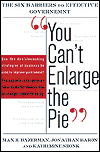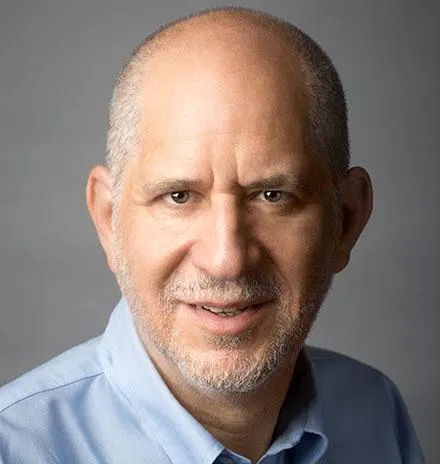In "You Can't Enlarge the Pie," the authors argue that barriers to effective government decision making result in poor decisions about critical issues like the environment, organ transplants, and energy policy. Why? Because government leaders have hidden psychological biases that distort decision making. These barriers are:
Do no harm.
Their gain is our loss.
Competition is always good.
Support our group.
Live for the moment.
No pain for us, no gain for them.
The antidote? An approach used in the business schools, whereby students are taught to identify and correct hidden biases. The main goal of any government should be, the authors maintain, to enlarge the pie of resources that society has available to distribute. This is done by identifying wise tradeoffs for society as a whole.
But it's not just politicians who can benefit from this study. Any business leader—virtually everyone—can learn from incorporating a search for wise tradeoffs into their decision making.

This excerpt is from the book's introduction.
Imagine that you are listening to a series of campaign announcements, each made by a different politician running for national office. Consider how you would react to each politician's promises:
If elected, I will do everything possible to ensure that all Americans will be treated by the doctor of their choice and receive as much medical attention as they require.
If elected, I will do everything possible to enable every American to attend any university in this country.
If elected, I will do everything possible to ensure that America has the strongest defense forces in the world and that we are prepared to fight two major wars at a time.
If elected, I will do everything possible to protect the right of all Americans to carry the weapon of their choice without government interference.
If elected, I will do everything possible to guarantee that there will be no real reduction in Social Security or Medicare spending.
If elected, I will do everything possible to protect our natural environment and ensure that no additional species of animals or fish become extinct.
If elected, I will do everything possible to enact an across-the-board fifteen percent tax reduction.
Undoubtedly, some of these positions appeal to you more than others. Some you simply do not like. Now consider the ones you like best. What is your opinion of the candidates who hold these positions? Do they strike you as wise?
Near-Pareto improvements include policy changes that create vast benefits for some and comparatively trivial losses for others.
—From You Can't Enlarge the Pie
We will argue that all these politicians are lacking in wisdom. Each expresses a view on a single position and promises to do "everything possible" to enact it. None of them mentions the possible tradeoffs or costs related to each new policy. Nor do they discuss how their proposed policy would interact with other policies and issues. The fact is, increased spending on medical care, defense, education and so on guarantees that fewer taxpayer dollars and government resources will be available for other initiatives. It may also mean that the national debt will increase, imposing a heavy burden on future generations. Similarly, politicians who vow to protect the freedom to own all types of firearms are implicitly condoning the death of innocent people through lax gun laws. Candidates who promise to do "everything possible" to enact a specific policy are neglecting the tradeoffs inherent in all political decisions.
When people engage in political discussions, they typically focus on specific issues, such as those mentioned in the campaign promises presented above. They then evaluate politicians based on how well the politicians' positions match their preferences on these key issues. In other words, they focus more on goals than on results. Yet when evaluating business leaders, most people judge them primarily by results: profitability, return to shareholders, innovation and so on. This is the more rational measure of effectiveness. An organization's overall health will generally have a greater effect on an individual employee or citizen than its stance on specific issues. Why do we judge government by one standard and the private sector by another?
In this book, we argue that the way citizens and government currently think about real-world problems is dangerously narrow. We believe that a core objective of any government should be enlarging the pie of resources that society has available to distribute. Yet few citizens judge their leaders according to this key attribute. By focusing on vivid issues covered widely in the media, they ignore one of the most important issues: Valuable resources are often misused, squandered and ignored.
These resources are vast and diverse, ranging from tax dollars and the time of government bureaucrats and officials to national resources such as forests and mineral deposits. All these commodities are finite, and all have been squandered in nations across the globe as a result of inefficient government decisions. This book documents the many realms in which we miss the opportunities to increase the resources available to society. Here are a few examples:
People who die in automobile accidents are often buried with their healthy organs intact. Meanwhile, thousands die because of the lack of organ donors. Most of us would be willing to trade our organs upon our deaths in exchange for access to organs if we needed them. This mutually beneficial trade occurs far too rarely.
Environmentalists want to strengthen legislation to better protect biodiversity. Land developers do not want "Washington" telling them what they can and cannot do with their property. Both sides battle for increased or decreased legislation while ignoring possibilities for wiser regulation through joint problem solving.
When a sports team threatens to move to a new location, a bidding war ensues among different American cities. The winner typically pays more than the team is worth, and the losers often end up with empty stadiums. By focusing on keeping their teams with little or no regard for the long-term costs, taxpayers have spent vast sums of money making wealthy sports team owners even wealthier.
The American government currently subsidizes timber and paper companies for chopping down national forests. A business that operated as the government does would quickly go out of business. The government provides welfare to the timber industry because the public consistently ignores the degree to which special-interest groups have corrupted the legislative process.
The world's great fishing basins are in decline. New England's proportion of the world fishing harvest is down by ninety percent. Although the warning signs were clear fifteen years ago, fishers have successfully fought the regulation of their industry. Their rash behavior will deprive future generations of entire species of nutritious fish. Long-term thinking about intergenerational issues is lacking in this and many other public decision-making arenas.
Free trade prevents war, cuts inflation through price competition, increases efficiency and makes better goods and services available to citizens across the world. Why then do so many people fight free trade? A primary reason is loyalty to the short-sighted interest of a group. Groups that benefit from import restrictions organize to maintain their prerogatives at the expense of others. Another reason is the human tendency to resist any policy change that leads to harm as well as benefit.
These are complex issues. Politicians and activists have been trying to solve some of them for decades; but these same politicians and activists have consistently ignored others. We believe that partial solutions to these problems are surprisingly clear.
The Psychology Of Flawed Decisions
We write from the perspective of psychologists who study imperfections in the way people make decisions. Since the early 1980s, it's become clear that many of the errors people make have to do with the difficulties they have in making and understanding tradeoffs. This book will illustrate how this new understanding of tradeoffs can clarify the flaws in existing government policies and lead to better policies.
By identifying wise tradeoffs, we can expand the resources available to society as a whole. This may mean, for example, increasing the average income per citizen; meeting the demand for donated organs; or improving the natural environment. We will present real-world examples in which we can increase two or more social goods at the same time—for example, improving both the economy and the environment through creative trades.
Although other scholars have written about flawed government decisions and the failure of policymakers to discover wise trades, these writers have typically viewed such problems through the common lenses of political science and economics. We seek to expand the discussion by focusing on the limitations of the human mind. Most people recognize tradeoffs as exchanges that result in both a gain and a loss, but the human mind consistently overlooks wise tradeoffs—trades in which gains significantly exceed losses for all parties involved. This tendency is pervasive: It affects the educated and the uneducated, those inflamed by passion for an issue as well as those who pride themselves on their cool-headed rationality. Virtually everyone can benefit from incorporating a search for wise tradeoffs into their decision making.
Wise tradeoffs involve a type of policy change that economists call "Pareto improvements." A Pareto improvement is a change in policy that makes some people better off and no one worse off. Unfortunately, true Pareto improvements are very rare in government policy making; most changes will require sacrifices from some members of society. Thus, in many cases, we will be advocating what economist Joseph Stiglitz calls "near-Pareto improvements." Near-Pareto improvements include policy changes that create vast benefits for some and comparatively trivial losses for others, as well as changes that would hurt only a small, narrowly defined special-interest group—in many cases, a group that has already manipulated the political process to its advantage. We agree with Stiglitz's argument that "if everyone except a narrowly defined special-interest group could be shown to benefit, surely the change should be made."
Social change must occur at two levels: How citizens think, and how the government creates policy. It will not suffice if only those who work in government learn to incorporate these principles. Citizens, too, need to become more familiar with the reasoning decision scientists use when they think about government. As citizens broaden their mindsets, they will influence other voters and special interest groups, and pressure the government to create wiser legislation.
Ideological, moral or religious debates such as struggles over abortion and capital punishment may seem to resist the type of tradeoffs we advocate. Parties who view the opposite side as morally wrong will often refuse to yield the slightest bit from their positions. Although we recognize that our recommendations will sometimes be impossible to apply, these cases are far rarer than most people realize. In certain instances, claims of intractability may be bargaining ploys that will yield to reasonable compromises. Negotiations promoting tradeoffs and compromise have proved effective in some of the most long-standing and bitter feuds—as recent peace accords in Northern Ireland suggest.

